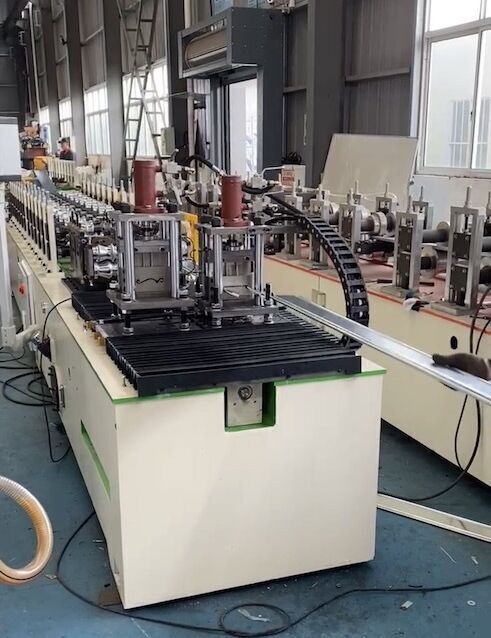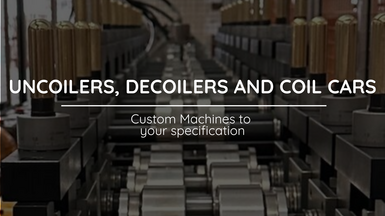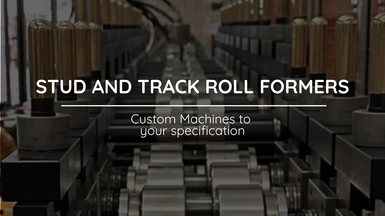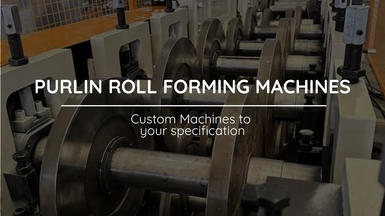
Shutter Roller Door Roll Forming Machines
Shutter roller door roll forming machines are highly automated and can produce components with high precision and consistency.
Posted on Tuesday, November 21, 2023
Shutter Roller Door Roll Forming Machine Description
Shutter roller door roll forming machines are specialized manufacturing equipment used to produce the components of shutter roller doors. These machines are commonly used in the construction and manufacturing industries to efficiently and accurately create the individual parts needed for the assembly of roller shutter doors.
Here's an overview of how these machines work and their key components:
- Material Feeding: The roll forming process begins with the feeding of a coil of metal material, usually steel or aluminum, into the machine. This coil serves as the raw material for forming the shutter door components.
- Roll Forming: The heart of the machine is the roll forming station, which consists of a series of rollers and tooling that gradually shape the flat metal coil into the desired profile. The rollers are precisely designed to bend the metal into the specific shape and dimensions required for the shutter door components.
- Cutting: After the metal has been formed into the desired shape, a cutting mechanism is employed to trim the formed material into individual sections of the roller door. This ensures that each component is the correct length.
- Additional Processes: Depending on the design and specifications of the roller door, the roll forming machine may include additional stations or tools for processes such as perforating, embossing, or punching holes in the components.
- Output: Once the components are formed and cut to the required specifications, they are typically stacked or conveyed for further processing, assembly, or packaging.
Shutter roller door roll forming machines are highly automated and can produce components with high precision and consistency. The exact design and capabilities of these machines may vary depending on the specific requirements of the roller door being manufactured. Different types of roller doors, such as residential garage doors or commercial security doors, may require different roll forming machines with varying levels of complexity and features.
These machines are an integral part of the manufacturing process for roller shutter doors, which are commonly used in various applications, including commercial buildings, warehouses, garages, and industrial facilities, for security, insulation, and access control purposes.
Roller Shutter Doors
Roller shutter doors, also known simply as roller doors or rolling doors, are a type of door commonly used in a wide range of applications, from commercial and industrial buildings to residential garages. These doors consist of a series of horizontal slats or panels that are hinged together and mounted on a track. They are designed to roll up or down vertically to open or close an opening, providing security, insulation, and ease of access.
Here are some key characteristics and features of roller shutter doors:
- Material: Roller shutter doors are typically made from materials like steel, aluminum, or sometimes, other metals. These materials provide strength, durability, and resistance to various environmental factors.
- Operation: Roller shutter doors can be operated manually or automatically. Manual operation involves using a hand crank or chain, while automatic operation involves an electric motor that raises or lowers the door with the push of a button or the activation of a remote control.
- Security: One of the primary purposes of roller shutter doors is to enhance security. When closed, they provide a robust barrier that is difficult to breach, making them ideal for securing commercial and industrial spaces.
- Insulation: Roller shutter doors can provide thermal and sound insulation. Some models are equipped with insulating materials or features to help regulate temperature and reduce noise.
- Versatility: These doors are versatile and can be customized to fit various openings, including windows, doors, loading docks, and storefronts. They are commonly used in warehouses, factories, garages, shops, and commercial storefronts.
- Space-saving: Roller shutter doors roll up into a compact coil above the opening when opened, saving space both inside and outside the building. This feature is especially valuable in settings where space is limited.
- Durability: Roller shutter doors are designed to withstand wear and tear, making them suitable for heavy-duty use. They are often built to withstand harsh weather conditions and offer resistance to corrosion.
- Visibility: Some roller shutter doors come with perforations or transparent sections that allow visibility into or out of the enclosed space, which can be useful in retail or commercial settings.
- Remote Control: Many modern roller shutter doors can be operated remotely, allowing for convenient and quick access without leaving a vehicle or building.
Roller shutter doors are available in various designs, styles, and sizes to meet the specific needs of different applications. They are an essential element in providing security and functionality in various industries and are chosen for their durability, ease of use, and adaptability to different environments.
Shutter Roller Door Profiles
Shutter roller door profiles refer to the individual slats or panels that make up the door's curtain or surface. These profiles are designed to interlock and create the flexible but sturdy barrier that rolls up and down when the roller shutter door is operated. The choice of profile design and material can affect the door's performance, security, insulation, and overall appearance. Here are some common types of shutter roller door profiles:
- Flat Slats: Flat slats are the simplest and most common type of roller door profile. They consist of straight, flat panels that are often made of steel or aluminum. They provide a clean and minimalist look and are well-suited for security and industrial applications.
- Curved Slats: Curved slats are designed with a slight curve in their shape. This curvature enhances the strength and rigidity of the door while maintaining a relatively smooth appearance. Curved slats are often used in residential and commercial roller doors.
- Perforated Slats: Perforated slats have small holes or openings across their surface. These openings allow for ventilation and visibility when the door is closed. Perforated slats are commonly used in storefronts, malls, and commercial applications where some visibility or airflow is desired.
- Insulated Slats: Insulated slats are constructed with two layers of metal with insulation material in between. These slats provide better thermal insulation and are ideal for environments where temperature control is essential, such as warehouses or facilities that require climate regulation.
- Transparent Slats: Some roller shutter doors use transparent slats made from materials like polycarbonate. These slats allow natural light to enter the space and offer visibility when the door is closed, making them suitable for showrooms and applications where aesthetics and visibility are important.
- Foam-filled Slats: Foam-filled slats have a foam core that adds insulation properties while maintaining strength. They are energy-efficient and help reduce heat transfer, making them suitable for buildings that require temperature control and energy savings.
- Ribbed or Wavy Slats: Ribbed or wavy slats have a textured or corrugated surface that enhances the door's strength and durability. These profiles are often used in industrial or heavy-duty applications.
- Custom Profiles: In some cases, roller shutter doors are customized with unique profiles to meet specific design or functional requirements. Custom profiles can be designed to match architectural aesthetics or serve specific industrial purposes.
The choice of roller door profile depends on the intended application, security requirements, insulation needs, and aesthetic preferences. Different profiles offer varying levels of strength, visibility, and insulation, allowing for flexibility in choosing the right roller shutter door for a particular use case.
Roller Shutter Doors Prices
The prices of roller shutter doors can vary widely depending on several factors, including the type of roller shutter door, its size, material, features, installation requirements, and location. Here are some general guidelines and price ranges for different types of roller shutter doors:
- Residential Roller Shutter Doors:
- Basic manual residential roller shutter doors made of aluminum or steel: $500 to $1,500 or more, depending on size and features.
- Motorized residential roller shutter doors with remote control: $1,000 to $3,000 or more, depending on size, material, and features.
- Insulated residential roller shutter doors for better thermal performance: $1,500 to $4,000 or more, depending on size and insulation quality.
- Commercial Roller Shutter Doors:
- Basic commercial roller shutter doors for storefronts or warehouses: $1,000 to $4,000 or more, depending on size and material.
- Heavy-duty industrial roller shutter doors with added security features: $3,000 to $10,000 or more, depending on size and security requirements.
- High-speed commercial roller shutter doors for quick access: $3,000 to $7,000 or more, depending on size and speed capabilities.
- Custom Roller Shutter Doors:
- Custom-designed roller shutter doors with unique profiles, materials, or special features: Prices can vary significantly based on the complexity of the design and materials used. Costs can range from a few thousand dollars to tens of thousands of dollars or more.
- Installation Costs:
- Installation costs can also vary widely based on factors such as the complexity of the installation, location, and whether you're replacing an existing door or installing a new one. Installation costs can range from a few hundred to a few thousand dollars.
- Additional Costs:
- Additional costs may include accessories like remote controls, sensors, safety features, and any customization options. These can add a few hundred to a few thousand dollars to the total cost.
It's important to obtain quotes from multiple suppliers or manufacturers to get an accurate estimate for your specific roller shutter door needs. Additionally, consider the long-term cost savings that may come from energy-efficient or insulated roller shutter doors, as they can contribute to reduced heating and cooling expenses.
Keep in mind that the prices provided here are general estimates and can vary significantly depending on local market conditions, labor costs, and individual project requirements. To get an accurate price for a roller shutter door, it's recommended to consult with local suppliers, manufacturers, or contractors who can provide quotes tailored to your specific needs.
All our machines are all due to variations in the customer's demand, and we are always ready to assist with any issues. All machines are assembled by our expert team in Orlando, Florida. We have been leading the Roll Forming Machine market since 2009, and have great expertise, so you will be in safe hands. For further information, contact our team here.
For more Machines, browse our extensive range here
Roll Forming Machines LLC's New Factory
Posted on Sunday, March 23, 2025
We have relocated factories, which will be available for tours very soon.

Uncoiler, Decoiler and Coil Car Roll Forming Machine Accesories from Roll Forming Machines LLC
Posted on Sunday, November 24, 2024
Contact us today with your specifications for a custom Uncoiler, Decoiler or Coil Car at sales@rollformerusa.com or call us at (+1) (407) 859 1119

Stud and Track Roll Forming Machines from Roll Forming Machines LLC
Posted on Saturday, November 23, 2024
Contact us today with your specifications for a custom Stud and Track Machine at sales@rollformerusa.com or call us at (+1) (407) 859 1119

Cee and Zee Purlin Roll Forming Machines from Roll Forming Machines LLC
Posted on Saturday, November 23, 2024
Contact us today with your specifications for a custom Cee and Zee Purlin Machine at sales@rollformerusa.com or call us at (+1) (407) 859 1119